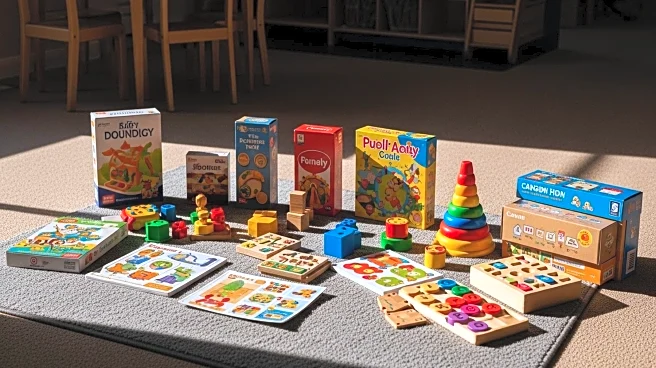What is the story about?
What's Happening?
Andrea Edson, an adjunct professor at Lesley University and former kindergarten teacher, has expressed concern over the increasing academic demands placed on kindergarten students. In a recent opinion piece, Edson highlighted the shift towards a more academically focused curriculum in early childhood education, which she believes undermines the importance of play, joy, and discovery in learning. Edson reminisces about her 30-year teaching career, emphasizing the value of creativity and meaningful play in fostering cognitive, physical, social, and emotional development in young children. She advocates for a renewed emphasis on child-centered and developmentally appropriate curricula that honor the natural curiosity and developmental needs of children.
Why It's Important?
The shift towards a more academic curriculum in kindergarten reflects broader educational trends that prioritize measurable academic outcomes over holistic development. This change has significant implications for early childhood education, potentially affecting the way children develop foundational skills and attitudes towards learning. Advocates like Edson argue that play-based learning is crucial for fostering a love of learning and supporting overall development. The debate over curriculum standards in kindergarten could influence educational policy and practices, impacting teachers, students, and parents nationwide. Ensuring that early education remains balanced and developmentally appropriate is essential for nurturing well-rounded individuals.
What's Next?
As discussions around kindergarten curriculum continue, educators and policymakers may need to reassess the balance between academic rigor and developmental appropriateness. There could be increased advocacy for policies that support play-based learning and recognize its role in child development. Schools and districts might explore innovative approaches to integrate play and discovery into academic learning, potentially leading to curriculum reforms. Stakeholders, including educators, parents, and child development experts, are likely to engage in ongoing dialogue to ensure that kindergarten education aligns with the best interests of young learners.
Beyond the Headlines
The emphasis on play-based learning in kindergarten raises broader questions about educational priorities and the long-term impact of early childhood education on societal values. It challenges the notion that academic achievement should be the sole focus of education, advocating instead for a more holistic approach that considers emotional and social development. This perspective could influence how future generations view learning and success, potentially leading to cultural shifts in how education is valued and implemented.

















